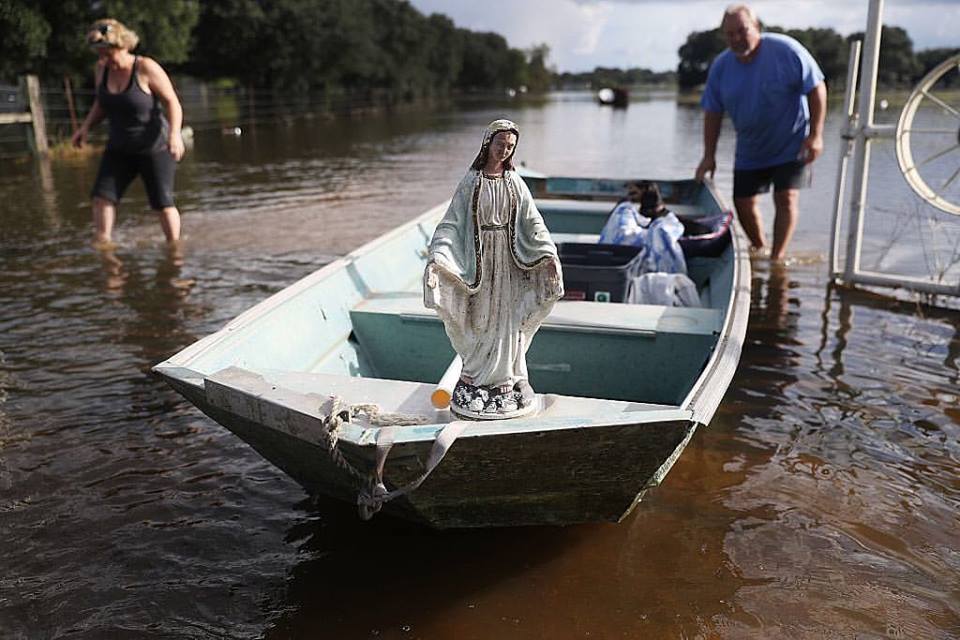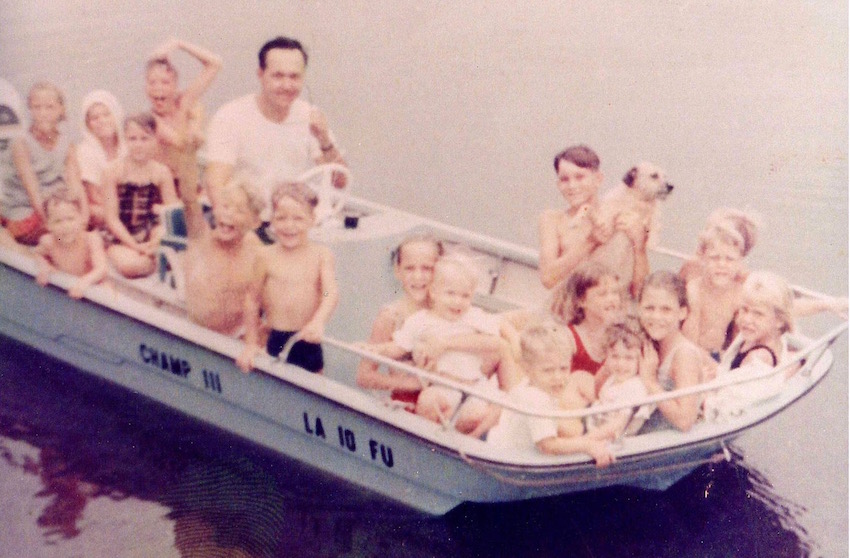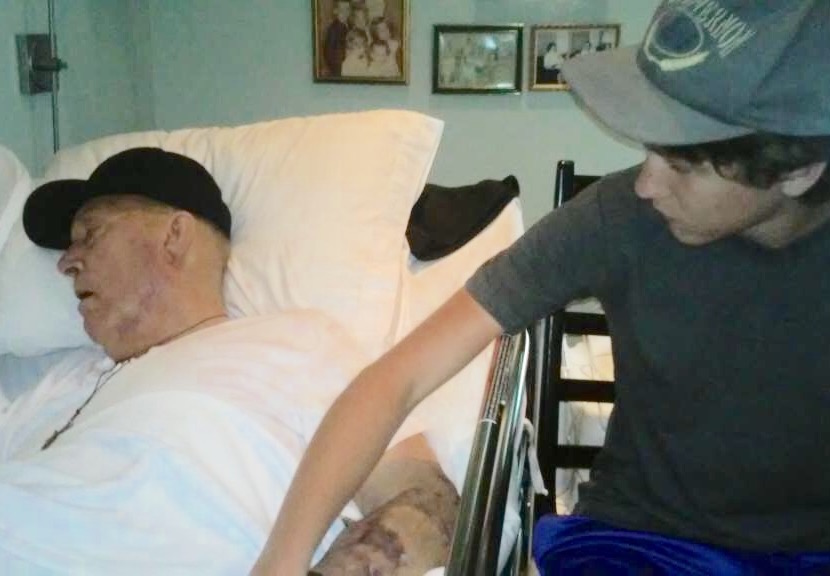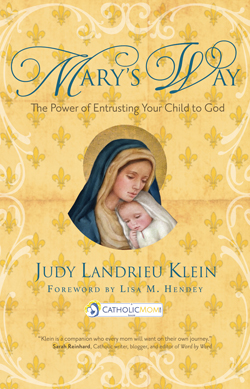Here we go again, you may be moaning as a painful situation rears its ugly head one. more. time. Perhaps you’ve prayed for a miracle for years, decades, even a lifetime. Maybe you’re exhausted from asking God to answer a prayer, or just flat angry at him for apparently not hearing you—especially if you’ve begged incessantly for something good, like a healing, conversion, or cure—something God would surely want, right?...
Read moreHow Dung Helps Flowers Grow: What God Does With Our "Crapola"
 I will heal their defection, says the Lord, I will love them freely; for my wrath is turned away from Israel. I shall be like the dew for Israel: he shall blossom like the lily; he shall strike root like the Lebanon cedar, and put forth his shoots. His splendor shall be like the olive tree and his fragrance like the Lebanon cedar. Hosea 14: 5-7
I will heal their defection, says the Lord, I will love them freely; for my wrath is turned away from Israel. I shall be like the dew for Israel: he shall blossom like the lily; he shall strike root like the Lebanon cedar, and put forth his shoots. His splendor shall be like the olive tree and his fragrance like the Lebanon cedar. Hosea 14: 5-7
It happens every spring. Just as I’m walking around the neighborhood gleefully absorbing the exquisite sights and smells of sweet Louisiana blooms, I get a whiff of something putrid.
Then I remember.
Dung is used as fertilizer in many local gardens, and my garden always does best when I buy the soil advertised as laden with cow manure.
I don’t know about you, but some days I feel plain 'ole crappy about my life. I agonize about mistakes made, opportunities missed, and relationships mired in misunderstanding. I spew apologies, wish for do-overs and rake myself over the coals.
The mercy is, when I finally settle down enough to ground myself in God’s presence, I don’t get mud thrown in my face. Instead, I hear the Lord’s gentle voice whispering: I will heal your defections…I will love you freely…you shall blossom like the lily.
We can be master builders of our own whipping posts, ready and willing to bind ourselves inexorably to every last lash. We can view our failures to love in endless 3-D projections, seeing only the terrible tearings that teased out death. We can rend ourselves asunder with regret, obsessing over our belief that we were supposed to get things right.
We can even call this humility, when the sad fact is that all of this rumbled reasoning reeks of an unholy focus on self, not of holy faith in God.
Because faith in God means that we see our defects—redeemed by God’s grace—as glorified gashes in our humanity capable of spawning new life. Faith in God means we trust that when our personal capabilities crash, God’s competence rises up to save us. Faith in God means that we adjust the lens of our reality to magnify God’s magnanimous mercy instead of our many measly mistakes.
What faith basically means is just that this shortfall that we all have in our love is made up by the surplus of Jesus Christ’s love, acting on our behalf. He simply tells us that God himself has poured out among us a superabundance of his love and has thus made good in advance all of our deficiency. Ultimately, faith means nothing other than admitting that we have this kind of shortfall; it means opening our hand and accepting a gift. Joseph Ratzinger (Pope Emeritus Benedict XVI), What It Means to Be A Christian
In other words, we can’t. God can. Will we let him?
Johann Wolfgang von Goethe once said: "The best fortune that can fall to a man is that which corrects his defects and makes up for his failings." I’d call that fortune grace. What sweet relief that our “dung,” infused with God’s grace, becomes fertile territory where fragrant trees grow and flowers bloom.
How Advent Helps US: Seeing Our Limitations as an Opening for God’s Greatness
 Those who see only limits feel lost in a senseless universe. They live a despondent life-style. Those who see limits as possibilities to go beyond live a hopeful life-style…True freedom is found in people who maintain what the philosopher Paul Ricoeur calls ‘the passion for the possible.’ Susan Muto, Blessings That Make Us Be, 4-5
Those who see only limits feel lost in a senseless universe. They live a despondent life-style. Those who see limits as possibilities to go beyond live a hopeful life-style…True freedom is found in people who maintain what the philosopher Paul Ricoeur calls ‘the passion for the possible.’ Susan Muto, Blessings That Make Us Be, 4-5
As December dawns and propels us toward the celebration of Christ’s birth, we are bidden to be an Advent people, to experience this sacred time with a “passion for the possible.” In short, we are reminded to live in hope.
In the darkest time of year, we light candles to remember the Light who has come into the world. On the shortest of days, we stretch forward in both anticipation and acknowledgement of God with us. As winter begins to dawn and flowers wither and die, we carry fresh, live trees into our homes to be lighted and ornamented with dazzling color, reminding us that we carry hope precisely by affirming what is alive and beautiful in our midst.
To be an Advent people is to make Christ’s coming truly present among us, not as some far-off distant memory, but as a calling forth into the present moment the presence of the One who is real. To be an Advent people is to choose not to ignore the pain and darkness in this world, but instead to embrace those realities with confidence and trust that Someone has come, is coming, and will come again to liberate us from the long night of sin.
Advent hope breaks right through the misery of sin to remind us of the mercy of God. It clears our vision of earthly concerns by inviting us to see light in the darkness. It blesses the human condition by remembering that a fully human God has redeemed our frail humanity. Advent is the hallowed time during which we gratefully acknowledge that our finite limits have already been met by eternal limitlessness.
Each and every day that we awaken, we are confronted anew with our limitations, be they tiredness from a sleepless night, fresh angst over troubled relationships, or the remembrance of failures and tribulations we must face again that day. But to arise resting assured that we are the fragile, fallible children of an all-powerful, infallible God makes us an Advent people: a people who see “limits as possibilities to go beyond,” who believe that the God-man has already gone beyond every human finitude.
For Bethlehem was indeed a place of finitude. Poverty, deprivation, cold and dark provided the “nursery” for the birth of the Savior—the hallowed space where the Transcendent One broke into, and through, those stark actualities with divine presence. There, in abject humility, God offered starlight to open blinded eyes, babe-flesh to woo hardened hearts, and the silence and solitude of the night to quiet the whole human race unto awakening. There, the waters of a virgin womb ushered in a new creation—bringing not just life, light, and hope, but the remedy for every human constraint, conquerable only through infinite power.
Advent “enables us to hope in (God’s) unpredictable generosity toward humanity,” (Muto, 5). Not just two thousand years ago, but today and every day.
Will we let Advent draw us in? Will we touch and feed upon the divinity that begs our remembrance of God’s unbounded potential to heal our human impotence? Will we awaken afresh to God’s presence, to light breaking through our darkness, and to the reality that every human weakness is an opening for a manifestation of God’s greatness?
Advent is meant to inspire in us a “passion for the possible,” which sees instead of “the darkness of sin, despair, inhumanity and persecution” the “how much more of God’s promise of redemption” (Muto, 5).
It is Advent. Anything is possible.
Author’s note: Thank you to Susan Muto, PhD, for her beautiful insights on the Beatitudes, which I have applied liberally to the theme of Advent.
This article was previously published at Aleteia.
Advent Special: Order "Miracle Man" and "Mary's Way" now to receive a signed copies of both books plus a free "Mary's Way" Consecration Prayer Card. Bundle price $25 at www.memorareministries.com. Order yours today.
Fitting Through the Narrow Gate: Feeding the False Self As A Sign of the Times
Strive to enter through the narrow gate; for the gate is wide and the road broad that leads to destruction, and those who enter it are many. How narrow the gate and constricted the road that leads to life. And those who find it are few. Matthew 7:13-14
It’s been said that much of American Christianity today preaches the Gospel to the “false self”—the self that Jesus warned can’t fit through the narrow gate. So much of the message currently conveyed in Christian churches is geared at making us feel good about ourselves instead of challenging us to die to ourselves. Hence, our overblown cultural identification with what’s come to be called “Churchianity”—a feel-good system of punching Sunday attendance cards which demands no radical change of its adherents—has yielded a post-Christian culture that is anorexic in its moral fiber yet obese in its habits of pleasure-seeking, consumption and entertainment.
So what, exactly, is this “false self” that’s been fed to the point of implosion? It’s a term coined by Trappist monk Thomas Merton to describe the fallen, sinful self that operates in opposition to the power of the Holy Spirit—the egocentric self who is driven by pleasure, power, popularity, and possessions instead of by imitating Jesus Christ, the man of the beatitudes. This “self” is both sneaky and subtle, and it only comes to light in the burning glare of the Spirit’s hot fire, which both challenges and equips us to die to our fallen self and live as a new creation in Christ.
Merton described the false self eloquently in his book, New Seeds of Contemplation:
Every one of us is shadowed by illusory person: a false self. This is the man that I want myself to be but who cannot exist, because God does not know anything about him. And to be unknown of God is altogether too much privacy. My false and private self is the one who wants to exist outside the reach of God’s will and God’s love – outside of reality and outside of life… All sin starts from the assumption that my false self, the self that exists only in my own egocentric desires, is the fundamental reality of life to which everything else in the universe is ordered. Thus I use up my life in the desire for pleasures and thirst for experiences, for power, honor, knowledge and love, to clothe this false self and construct its nothingness into something objectively real. I wind experiences around myself and cover myself with pleasures and glory like bandages in order to make myself perceptible to myself and to the world. (New Seeds of Contemplation, 34-35)
St. Paul called the false self the “flesh”—the same self Jesus describes in the verses immediately preceding and following his teaching on the narrow gate (Mt. 5:21-Mt. 7:28). This is the self who postures proudly, lusts after people, power and things, and constantly sits right on the fence instead of taking a stand. This is the self that lives for public approval, fasts and prays to be noticed and places its hopes and heart in passing fancies and treasures. This is the self that must decrease that Christ may increase, must die that we may truly live— the self to whom at the end of the day Christ can only say: I did not know you.
As a culture, failing to move beyond the collective false self has placed us directly into the precarious political and social climate in which we now live—a climate that has spawned two representative presidential candidates who incarnate the false self with its accompanying “works”:
Now the works of the flesh are obvious: immorality, impurity, licentiousness, idolatry, sorcery, hatreds, rivalry, jealousy, outbursts of fury, acts of selfishness, dissensions, factions, occasions of envy, drinking bouts, orgies, and the like…let us not be conceited, provoking one another, envious of one another. Galatians 5:19-21, 26
In contrast, we are called to feed the “true self”—the self who sells out completely to Christ, the self who is empowered by the Holy Spirit, the self who produces the fruit of “love, joy, peace, patience, kindness, generosity, faithfulness, gentleness, and self-control” (Galatians 5:22-23).
How do we find and fuel our true selves? St. Paul gives us the painful, but absolutely necessary, key. We “(crucify) our flesh with its passions and desires,” using our hard-fought freedom not to gratify the desires of the flesh, but to serve one another through love (Galatians 5:24,13). We trade countless hours of entertainment for committed hours of prayer, rampant materialistic consumption for frequent reception of Eucharist, and endless words of media-driven bantering for lavish meditation on the Word of God. In short, we feed our bodies and souls with Truth: Truth that alone can make us strong enough—and true enough—to enter the narrow gate (Luke 13:24).
This article was previously published at Aleteia.
Dear Self: How Holy Are You? How To Become Holy In One Not-So-Easy Step
IMG_3312
What does it mean to be holy? And how do we become holy?
These two questions burned in my mind for years as I moved from agnosticism, to fundamentalist Protestantism, then home to Catholicism. When I returned to the Catholic Church, I continued to ask the same questions about holiness as I specialized in apologetics, moral theology and bioethics. Finally, thanks to my life imploding, I came to the conclusion that holiness consists, quite simply, in love of and surrender to God.
Truth be told, I can now see that my trajectory within Christianity was an attempt, albeit a worthy one, to have an authority tell me the truth in black and white, give me the laws, and present me with the parameters in which to live. I used to joke that I just wanted someone to tell me the flipping rules so I could follow them!
Because deep down I knew that following the rules was a heck of a lot easier than surrendering to a wild, unpredictable God—especially a God who allows so much suffering in life. It took many years of prayer, study, soul-searching and, of course, personal suffering before I began to see that the essence of holiness is not formulas, facts or feats—good as those can be—but trusting God. And that the indispensable ingredients of holiness are hoping in God in all things, believing he is good no matter what, and surrendering to his love with abandon.
Sounds simple enough, right? Simple maybe. But easy, no.
Thanks to a suggestion by Amazon, I recently happened upon Dr. Peter Kreeft’s new book, How To Be Holy: First Steps In Becoming A Saint, which explains masterfully why holiness is simple but hard. Amazingly, at least to me, Kreeft affirms exactly what I’ve been trying to say in both my writing and talks—that holiness it isn’t about performance, but surrender. In other words, holiness has much less to do with asserting my will as it does with assenting to God’s. And therein lies the crux of Kreeft’s message.
With the brilliance, wit and logic that is classic Kreeft, the prolific author and philosopher sums it up neatly in these words:
“‘Abandonment’, or ‘islam,’ or ‘surrender',’ to God’s providential will is also the very essence of holiness.” Kreeft, How To Be Holy, 31
He builds his thesis on the truth that God is all-good, all-knowing and all-powerful, and upon St. Paul’s words in Romans 8:28 which say: “We know that all things work together for good for those who love God, who are called according to his purpose.”
Most of us would readily agree that God is good and working all things together for our good when things are carrying on happily in our lives; that is, when they are going according to “our will.” During these times, we are invited to cultivate the virtues of faith, hope and love by aligning our will with God’s and growing in relationship with him.
But it is when God allows us to be sanctified, or made holy, “against our will, through suffering” (Kreeft, 32), that we are frontally challenged to exercise the theological virtues in a more radical way. It is then that we must decide whether we really believe that God is good and whether we truly trust that what he is permitting in our lives is for our good. In these moments of permitted purification, we are beckoned to abandon ourselves with confidence to God’s providential will, allowing the fire of God’s love to burn away the dross of our own self-love and self-will—in a word, selfishness—which, Kreeft says is the main obstacle to holiness. When we assent to God in the midst of suffering, we begin to experience what the sage author calls “joyful, trusting self-surrender,” which requires saying: Not my will, but thy will be done.
And that, my friends, that hard prayer of willing, intentional surrender in abandonment to a God we believe is good and loving—in the teeth of what is often a hard-fought battle through suffering—is what makes us holy.
Simple perhaps. Easy no. But entirely possible with grace.
This article previously appeared at Aleteia.
Please visit my website to see the exciting updates and to grab some shareable graphics with quotes from "Mary's Way."
After the Flood: Cajun Armies Provide Spontaneous Volunteer Corps for Flood Relief

Possibilities are endless when we come together. Angelle Albright, Northshore Cajun Army
Cancer-survivor and Chemo Beanie inventor Angelle Albright made a deal with God: if she survived cancer, she would be his vessel and would wake up every day asking how he you could use her. God took her up on her promise the day after what is now called Louisiana’s Great Flood, and he quickly made his plans clear.
“I was lying on my sofa the night after the flood watching live coverage and feeling guilty that I’d just bought a brand new, enclosed 6 x 12 foot trailer to move furniture to our beach house in Florida,” Albright explained. “I was thinking that we have so much, and wondering what I could do to help those who had lost their homes.” Officials now estimate that 100,000 Louisiana residents are displaced as a result of the unprecedented amount of rain that fell last week, swamping 60,000 houses.
The next morning Albright spotted a Facebook post by the wife of the pastor of Christ’s Community Church in Denham Springs, located at the epicenter of the flood, asking for immediate donations of critical supplies. There were eight things on the list, and Albright felt called to fill her trailer with the needed items and deliver them to the church the next day. “I put out a call out on Facebook and posted the supplies that were needed by flood victims. Within two hours the trailer was filled with donations. Everybody in our community stepped up, including the Catholic churches and schools in our area.”
Albright immediately started using the hashtag #cajunarmy on her social media posts, playing off the name of a group of volunteers known as the Cajun Navy who evacuated people using boats during the flood. After learning that hers is one of a number of unconnected volunteer groups that go by the name of Cajun Army, Albright changed the name of her volunteer corps to “Northshore Cajun Army” to designate the Louisiana location from which her team primarily hails. She has since set up a Cajun Army Facebook page to meet the growing demand for information from volunteers asking how they can help.

Though her inspiration to offer assistance came just over week ago, Albright and her sidekicks, Gianna Schlottman and Karen Kleinpeter Lindsey, have since delivered 11 full trailers of provisions to Christ’s Community Church, where 1000 flood refugees had slept the night before they first arrived. The first thing needed was provisions for those sleeping at the church-turned-shelter, and Albright’s team quickly gathered a trailer full of pillows, blankets, underwear, diapers and personal items hygiene items for evacuees to use.
Next up were the supplies necessary to begin cleaning flooded houses, and donors sent buckets, bleach, brooms, mops, gloves and masks to scrub water-soaked homes. One generous contributor, who owns a janitorial supply company in nearby Bogalusa, donated $4000 worth of a special solution used to stop the spread of mildew in wet homes, saving numerous residences from further destruction. Donations continue to arrive, and Albright now coordinates daily with Shannon Easley, the wife of the pastor whose Facebook post she first responded to, in order to secure a list of essential items for the next day. Additionally, a make-shift free store has been set up at the church, which the Northshore Cajun Army and others stock daily for those in immediate need of food, water, clothing, toiletries and critical cleaning items.
Financial contributions have also begun to arrive; money that Albright, Scholttman and others on their team, including Jackson, Mississippi based Debbie Hendry, have used to buy provisions at every Dollar Tree within a three hour radius of the flood zone. Someone sent a check that enabled them to purchase 800 mops, 800 buckets and 800 brooms—all one dollar each and all critical to scrubbing down homes in a timely manner to prevent further damage. Yesterday, Albright’s team set up a foundation called the Northshore Cajun Army Fund to collect contributions that will enable them to continue to meet the overwhelming demand for help they face daily. Their mission is to "develop and deploy resources to support relief and recovery."

“Every dollar and every donated item is one piece of hope,” says Albright, “hope that helps people take one step forward in rebuilding their lives.” Given the extent of the devastation, where miles and miles of homes and businesses are uninhabitable, much more help and hope will be required as people begin to rebuild their homes and communities from the ground up.
In spite of the level of shock and sadness she’s seen, Albright stands amazed by what she’s watched God provide through the generosity of volunteers, including numerous others unconnected to her personal efforts who have arrived pulling trailers of hot cooked food, cold drinks, and even ice cream. Eight thousand meals were served in the church’s parking lot last Saturday, and whatever was left over was sent out into the neighborhoods of flood victims to distribute to those who are now camping out in their destroyed homes. On Thursday, a Mardi Gras-style parade drove through one very poor neighborhood of 300 homes that still sits untouched by relief efforts, bringing hot food plus donations of every item necessary to begin cleanup efforts.
How long will the Northshore Cajun Army continue to help flood victims? “Until everyone is whole,” says Albright. “I can’t live with myself knowing how much they need—once you see the devastation it is impossible not to help.”
Donations to the Northshore Cajun Army Fund can be made here.
Donations can also be made to Catholic Charities of Baton Rouge.
This article originally appeared at Aleteia.
When Death Births Life: St. Bryce Missions Grows Out of a Family's Grief
“I went to the jungle thinking I was going to grieve, but God brought me there to heal,” author and full-time missionary Colleen C. Mitchell said as she sat on a stool in my kitchen, watching me prepare a pot of Crayfish Étouffée. Mitchell and I had met only a week earlier at a Catholic Trade Show in Chicago, but when I learned she was a native New Orleanian who would be coming through our hometown in a week, I insisted we get together. During our visit, Mitchell openly shared her story of heartbreak and grief, and how it led her family to a cloud forest in Costa Rica to serve as missionaries caring for the spiritual and physical needs of the indigenous Cabecar peoples.
Their journey to the jungle began in 2009 while Mitchell, her husband, Greg, and their six sons were living a normal, happy life as a Catholic homeschooling family. On what she called “a perfect homeschooling day,” tragedy suddenly struck when Mitchell found her three-month-old son, Bryce, unresponsive in his crib due to SIDS. Within a short time, the couple lost four more babies to miscarriage, leaving Mitchell completely shattered and irrevocably changed by the multiple heartbreaks and ensuing grief that had visited their lives.
Shortly after Bryce’s death, Greg became inspired to establish a non-profit organization in Bryce’s name for the purpose of sharing the Gospel. “I can’t say I opposed the idea,” wrote Mitchell in the exquisite new book that grew out of her grief entitled Who Does He Say You Are: Women Transformed by Christ in the Gospels. “But I could not make logical sense of how you give your heart away when you are holding its shards in bleeding hands.”
9781632531025_50896be0-fe96-42b3-8234-e71a251d5f3a_1024x1024
Still tentative about how they could help others while in so much pain themselves, Mitchell offered God and Greg a “weak-kneed” yes, and St. Bryce Missions was born. Not long after that, Greg visited Costa Rica on a business trip, coming home with a vision for their future that his wife had not imagined: moving their family to the Chirripo Mountains of south Central Costa Rica to minister to the unevangelized indigenous peoples who live on a government-provided reserve therein.
Making a radical leap of faith, Mitchell packed her family’s belongings and necessities into 12 suitcases, embarking “sight unseen on a journey of redemption” to the poorest area of Costa Rica, unsure of what lay before them. Three weeks into their new life in the remote jungle, tragedy struck again via the death of Greg’s mother, necessitating his departure from Costa Rica for three weeks. “It was then—as I sat broken-hearted, isolated and alone in the jungle with my boys, with no car, unable to speak Spanish, apart from everything and everyone I had known—that I realized I needed to get to know God in a new way.”
Mitchell spent long days sitting beside a running river with her Bible and journal in hand, meditating upon Gospel stories of Christ’s healing, transforming power as her boys played in the river’s clear waters. There the grieving mother began to hear Christ speaking life into her heart again, and it was there that she began to reclaim God’s vision of her by journaling the “tender mercies” the Lord gave her in prayer—the very journal entries that would eventually become the chapters of her beautiful new book.
“I began to own that even with all the cracks and broken places the last few years had wrought in me, I was beautiful and beloved to him, and I had a purpose. He wanted to use me,” she wrote. It would not take long for that purpose to be realized.
Mitchell began to notice that basic healthcare was inaccessible to the Cabecar women, forcing pregnant women to walk as many as ten miles while in labor trying to find a hospital in which to safely deliver their babies. Wondering how she could help, she hatched a plan in her mind to find and engage an existing organizational institution to solve the problem of making healthcare more accessible to these poor women. Again, God surprised her with an unimagined solution.
“One day in prayer, I heard God say, ‘Use what you have to meet this need,’” Mitchell told me as I sat listening in amazement. “You have a car, a house, and a way to get these people to the hospital. Share with them what I’ve given you.”
Mitchell said yes.
The very next day Mitchell and her husband encountered a Cabecar woman with an extremely sick baby who had already walked eight hours in the pouring rain to find medical help. They picked her up, drove her to the hospital, and stayed with her to make sure she received the care she needed, leaving their phone number with her in the event she had no way to get home upon the baby’s release from the hospital. The woman called the couple the next day, and ended up staying in their home for a week until the baby was stable enough to go home.
After this first encounter, the Mitchells put the word out that they were willing to help others, and more women began to show up. This influx eventually prompted the family to move to a larger home close to the hospital which sleeps 25 women in addition to their family of 7—bringing to life the St. Francis Emmaus Center, a home-based ministry that is only one of several initiatives St. Bryce Missions is currently undertaking to reach out to those on the peripheries of society with the Gospel. To date, over 700 Cabecar women have come through their doors to receive food, shelter, health education and health-care advocacy in the state-run medical system, receiving love and care from the Mitchells and their five still-homeschooling sons, all of whom are engaged in the work of St. Bryce Missions.
The Mitchell’s “yes” to God has birthed healing in hopelessness and grace in grief—for themselves and numerous others. Their efforts have not only spurred a 50% drop in the infant mortality rate among the people they serve, but has given whole families in an oft-overlooked part of the world the opportunity to encounter Christ.
This article appeared previously at Aleteia.
Mercy Upon Mercy: My Father's Final Farewell
 “At that last hour a soul has nothing with which to defend itself except My mercy.” —Diary of St. Faustina, par. 1075
“At that last hour a soul has nothing with which to defend itself except My mercy.” —Diary of St. Faustina, par. 1075
“Do you believe in God, Dad?” I asked from the driver’s seat as Daddy and I cruised down St. Charles Avenue heading for my parents’ New Orleans home.
My then-eighty-year-old father, known to cry freely, began to weep. “I’m totally dependent on God’s mercy, Judy Marie,” he choked out using my entire given name, which he’d called me exclusively since the day I was born. “What else is there?”
That conversation contained the most open display of faith I’d ever seen in my dad; a father of ten whom I’d never witnessed initiating prayer or church attendance. Daddy and I had never even talked about faith before, and we only stumbled into this conversation because he was attending my Health Care Ethics course at a local Catholic college. Our weekly post-class lunch together, and the drive home, left ample time for conversation but it seemed that the topic of God was the hardest thing to broach.
Until Daddy lay dying.
“Dad,” I said out loud as I held the hand of my lightly comatose father in what would be the last week of his life, confident he could still hear me. “Remember what you told me about being completely dependent on God’s mercy? Trust in the mercy of God when you meet him, Dad,” I continued. “That’s all you need to do.”
Family members had been gathering daily by Daddy’s bedside to pray the Rosary and Divine Mercy Chaplet, engaged in a vigil of prayer and personal attendance as he slept in a newly delivered hospital bed. At least one person from our large family sat next to him constantly, while others occupied nearby spaces—keeping company with Mama and each other, preparing meals, and running necessary errands.

“What a beautiful way to die,” I thought one evening as I stood in the kitchen tending a rump roast and sipping a glass of wine. I was overcome with awe by the sheer grace of it all, noting the powerful manner in which our father’s impending death had pulled us all to God and to each other; offering gratitude for the way a father’s final days had drawn a family that’s experienced more than its fair share of adversity, division and tragedy solidly together in faith, hope and love.
A priest friend had come by twice in eight days to offer Mass, anointing both of our ailing parents each time with the Sacrament of the Sick. At the second Mass at least thirty members of our extended family crammed around the dining room table to celebrate the liturgy—the same table at which at least a dozen people would gather for dinner another night to pool our hearts and prayers: intermittently praying, eating, crying, laughing, and sharing stories of our lives together. An Apostolic Pardon was given to Daddy, as well as the offering of love, peace and pardon from many family members. One particularly precious night, a room full of grown children raised our voices beside our unconscious father to thank him for the many gifts he’d given us, including endless hours spent in the scorching Louisiana heat teaching twenty-eight first cousins how to ski, crab, boat and fish in the murky waters of Lake Pontchartrain.
Life had not always been easy and Daddy had borne his scars, especially from the heart-shattering deaths of two of his sons to suicide. Indeed, life had seemed almost merciless at times and God far distant, and our now-fragile father had cried many tears over life’s bitter disappointments.
But now—at the hour of death when it mattered most—mercy upon mercy showed up.
A peaceful, holy death was granted to a man who had the grace to comprehend that he was “totally dependent on God’s mercy”—tender, faithful Mercy that drew us all into its embrace during a father’s final farewell.
This article previously appeared at Aleteia.
Pre-order my new book at MemorareMinistries.com.

The Painful Pruning of Our Diseased Hearts and the Glorious Mark of the Cross
They will be called oaks of righteousness, the planting of the Lord to display his glory.
Isaiah 61:3
They were at it again when I woke up this morning: amputating dead limbs from the majestic oak trees that line the brilliant white beaches of Pass Christian, Mississippi, which is perched like a pearl on edge of the Gulf of Mexico. Lying in bed at my sister Jojo’s tranquil beach house, I could hear the saws humming since practically the crack of dawn.
I’ve reflected a lot on the oaks in recent years, especially since they’re the only things that stayed standing when a massive tidal surge slammed these shores during Hurricane Katrina. That, thanks to deep roots grown over many long years, roots that held the trees in place when the “hundred year storm” swamped the entire Mississippi Gulf Coast. And though the oaks survived the hellacious storm, it’s been an ongoing project ever since to trim their dead branches, branches that require constant stripping in order for the trees to grow and prosper.
He takes away every branch in me that does not bear fruit, and every one that does he prunes so that it bears more fruit (John 15:2). I thought of Jesus’ words as I took a long walk beside the beach later in the morning, observing how many dead oak branches still need to be cut off. Like the oaks, we must all encounter the necessary pain of pruning, as the Divine Grower mercifully strips away everything in us that hampers our growth in him. Paradoxically, when God wields the pruning shears it is not for our destruction, but that we might have life. I experienced this first hand the year my late husband Bernie died, a year when many of my diseased beliefs about God were cropped off as a Category 5 storm blasted our lives.
I’d been dreaming about Bernie when I woke to the sound of saws, probably because yesterday was his birthday. Hit by a massive heart attack seven years ago, Bernie was given the great grace of undergoing a near-death experience, of clearly seeing the condition of his soul, and of being sent back by God to undergo, as he put it, “necessary purification.” Over the course of three long months in the ICU, Bernie suffered profusely as his life was stripped away, all the while discovering inexplicable peace, joy and love as the pruning hand of God reordered the very depths of his soul. Previously a very driven man, Bernie found himself devoid of all power, possessions and productivity, laid bare before a merciful Father who wished to communicate only one thing his broken son, a mantra Bernie would repeat many times during his short time left on earth: You have no idea how much God loves you.
When Bernie got sick I, too, was in need of radical healing; healing of my trust in God’s unbounded goodness. A deep wound of mistrust in God had festered in me since childhood, keeping me in a defensive posture against a distorted image of an angry, exacting God I believed was out to get me. It wasn’t until an unexpected cyclone hit our lives that those distorted beliefs were cut away, when I personally experienced the miraculous love and goodness of a Father who demonstrated in no uncertain terms that he would not only hold me steady in the teeth of death and devastation, but would do so with unspeakable tenderness and love.
So much of our walk with God is about encountering the inevitable storms of life, and about what the tsunamis that hit us expose in our hearts. Do we trust the Lord with all of our hearts, believing that he’s not out to get us, but that he’s got us? Do we believe that God loves us, that he is good and that he works all things together for our good, even the things we may consider disastrous?
One thing I noticed about the oaks is that they each bear a telling mark of their stripping; a mark that often takes the shape of a cross. The cross that takes shape in their flesh is a sign not only of their struggle for survival but of their pruning, the very pruning that leads to transformation and new life.
This article previously appeared at Aleteia.
Hope For Troubled Parents: Become A Child Yourself
 Twice recently I've heard parents say: “I did everything right, and my child is still doing (name your favorite sin).” “Good luck with that!” I responded to one of them in a voice that was louder and more vigorous than I intended. Because the lie that if you do it all right, then you’ll be guaranteed a good result is a form of an ancient heresy known as Pelagianism. The old heresy now has a new moniker: the Prosperity Gospel, which purports that if I do X and Y then I will earn Z from God. Oh, how it misses the point of God’s grace!
Twice recently I've heard parents say: “I did everything right, and my child is still doing (name your favorite sin).” “Good luck with that!” I responded to one of them in a voice that was louder and more vigorous than I intended. Because the lie that if you do it all right, then you’ll be guaranteed a good result is a form of an ancient heresy known as Pelagianism. The old heresy now has a new moniker: the Prosperity Gospel, which purports that if I do X and Y then I will earn Z from God. Oh, how it misses the point of God’s grace!
What a relief to heartily admit what two of the greatest saints of our era, namely St. Faustina and St. Therese of Lisieux, freely admitted: they couldn’t get it right. While simultaneously reading St. Faustina’s Diary and Fr. Michael Gaitley’s 33 Days to Merciful Love, I was almost giddy when I happened upon Faustina and Therese’s own words:
O my God, I understand well that you demand this spiritual childhood of me…I am an abyss of misery, and hence I understand that whatever good there is in my soul consists solely of His holy grace. The knowledge of my misery allows me, at the same time, to know the immensity of Your mercy. (St. Faustina, Diary, par. 56.)
And if the good God wants you weak and helpless like a child…do you believe you will have less merit?...Agree to stumble at every step, therefore, even to fall, to carry your cross weakly, to love your helplessness. (Gaitley, quoting Therese, 56)
Before I read those words, I’d been feeling particularly low about the mistakes, failures and foibles I’ve made as a parent. But surprisingly, every time I turned to the Lord for guidance he said the same thing to me: Become a child yourself.

Why?
Children are spontaneously, intuitively in touch with their own neediness, and they are quick to ask for help. Children have open hands and open hearts, and they stand ready to receive love with gratitude and joy. Children live in expectant faith that if they fall, fail or flail their Papa is going to take care of it—and he’s going to take care of them, too. Children trust completely.
This is the way of spiritual childhood that Faustina and Therese found so liberating; it is the way of the child through which we, too, must pass in order to enter the kingdom of heaven. The way of spiritual childhood is the path of humility and trust: I freely and humbly admit that I’m a hot mess, while furiously trusting that I am loved and redeemed by a merciful God who is bigger than all of my sins and weaknesses.
Of course, I try my best to live and love according to the ways of Christ. And when I fail to do so I turn to God, trusting that he will fill in the gap of all I am lacking in love and holiness with his love and holiness, and that his offering is superabundantly sufficient. Joseph Ratzinger (Pope Emeritus Benedict XVI) said it this way:
What faith basically means is just that this shortfall that we have in our love is made up by the surplus of Jesus Christ’s love, acting on our behalf. He simply tells us that God himself has poured out among us a superabundance of love and has thus made good in advance all our deficiency. Ultimately, faith means nothing other than admitting that we have this kind of shortfall; it means opening our hand and accepting a gift. (Ratzinger, What It Means to Be A Christian, 74).
Are you fretting about all you lack as a parent? Then become a little child. Abandon yourself and your children completely to God, trusting that his love will make up for whatever is lacking in yours. This is grace. For as the Little Flower herself insisted, all is grace.

This article was previously published at Aleteia.




